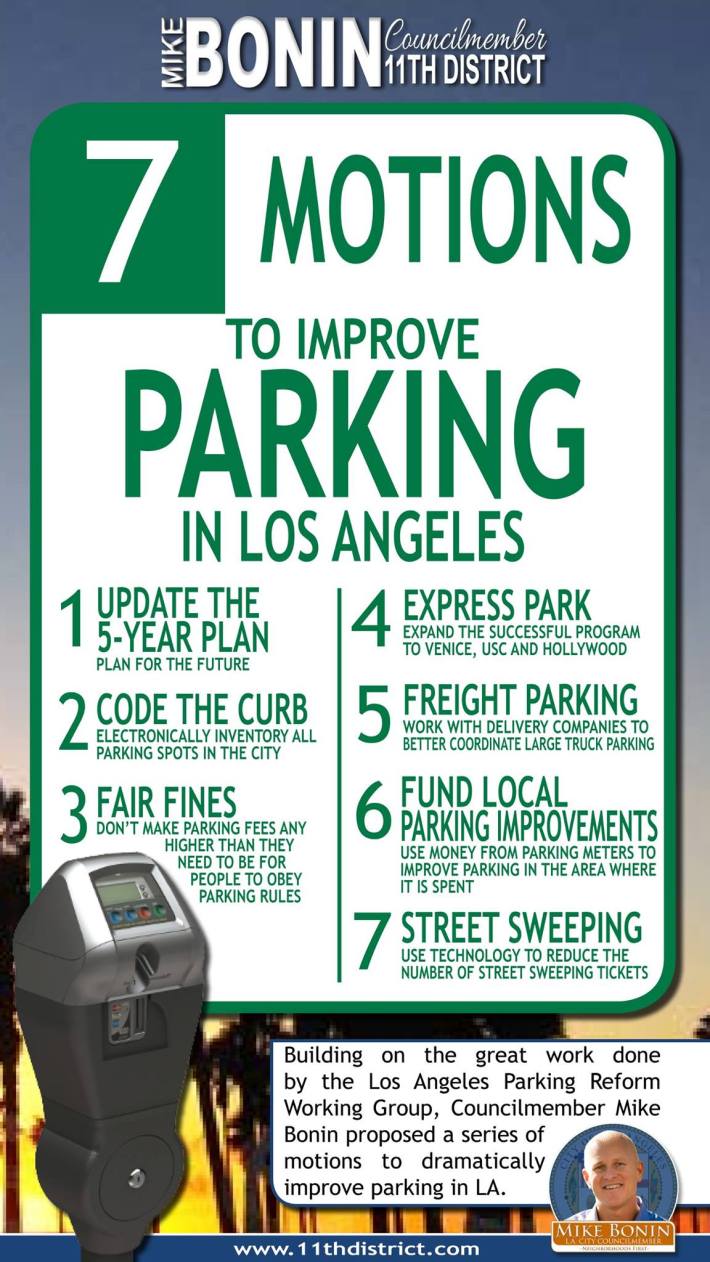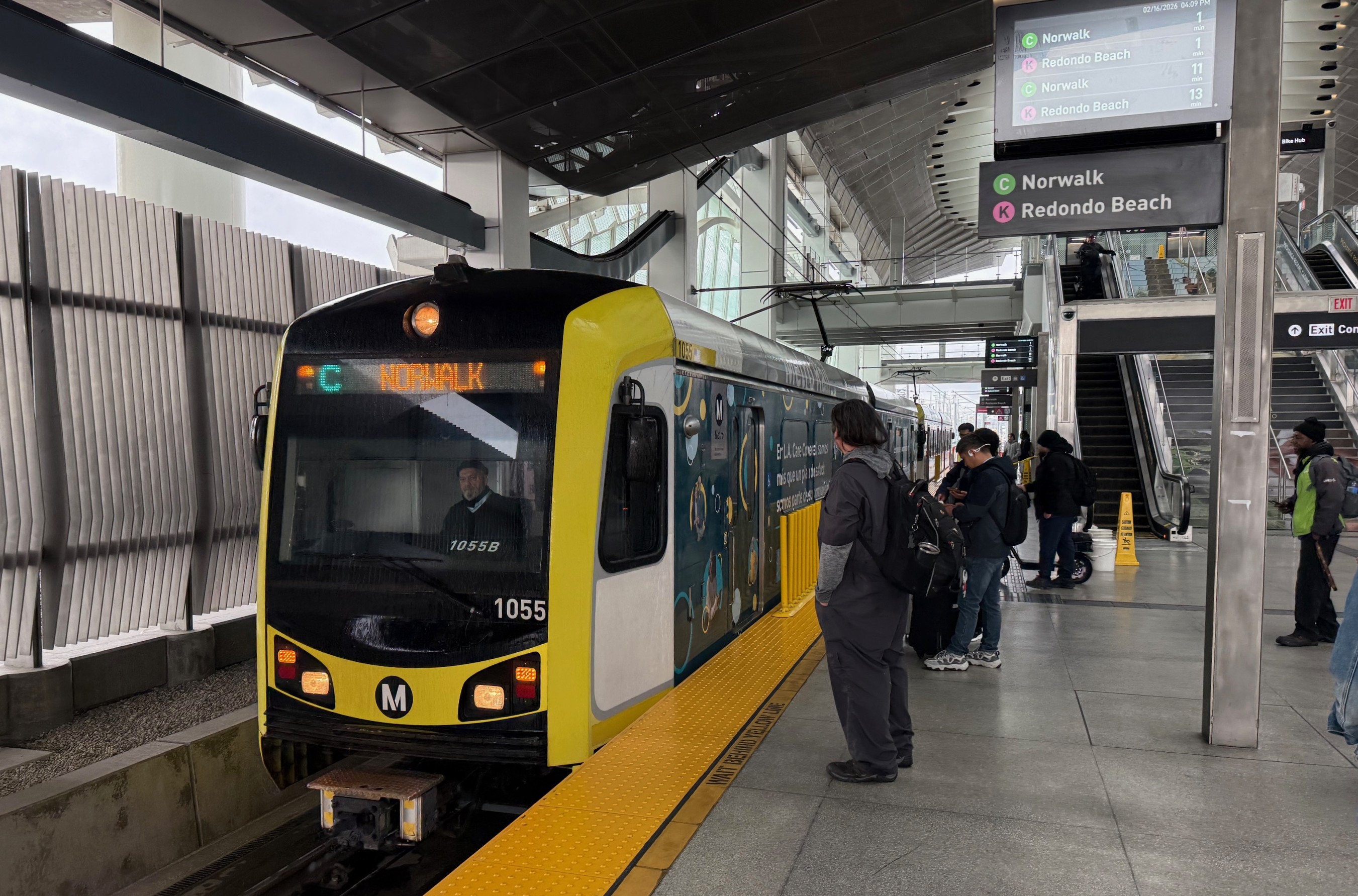
Today, Los Angeles City Councilmember Mike Bonin introduced seven council motions [PDF] that would reform parking. The motions are wide-ranging: from diverting parking meter revenue back into neighborhoods where it is generated, to tiering parking ticket fines, to expanding dynamic pricing via Express Park.
The motions grew out of recommendations from Mayor Garcetti’s Los Angeles Parking Reform Working Group's final report titled “Proposals for Parking Reform in the City of Los Angeles” [PDF] as discussed at Transportation Committee in October.
Here is a run-down of Bonin's seven parking reform motions:
- Update L.A.'s Five-Year Parking PlanIn some ways this is Bonin's omnibus motion that carries motions number 2, 4, and 6 below. The Department of Transportation (LADOT) is due to submit its occasional maintenance and operations plan for city parking, including city parking revenue. Bonin's motion requests that LADOT's next parking plan include: expansion of Express Park, "Code the Curb," and "a pilot project to return a portion of parking meter revenue for investment in local transportation improvements."
- “Code the Curb”Enabled/funded by motion 1 above, Bonin's motion sets up city departments to do an electronic inventory of all of the city’s parking assets. This will enable the city to implement "dynamic digital parking systems that can communicate with the public in real-time and replace the static parking regulations of today."
- Ensure Fair FinesOne mantra of the Los Angeles Parking Freedom Initiative has been to make parking ticket fines less onerous. Bonin’s motion directs city departments to evaluate a tiered pricing scheme where first-time offenders pay less, and drivers with multiple violations gradually get stiffer and stiffer fines.
- Expand Express ParkBonin is seeking to expand L.A. Express Park variable-priced meter parking now in effect in downtown L.A. and recently expanded to Westwood. The way Express Park works is that the city monitors how full on-street parking spaces are, then adjusts parking meter prices with a goal of keeping between 70 and 90 percent of spaces occupied. On blocks where there is little demand for parking, hourly rates are made cheaper. On blocks where it is very hard to find an open space, hourly rates are increased. Meter rates also vary by the time of day and the day of the week.The motion specifically looks to expand Express Park to Venice, Hollywood and Exposition/USC areas, and then to all metered parking throughout the city.
- Coordinate Freight ParkingThis motion directs LADOT to develop a program to make commercial vehicle delivery work more smoothly. LADOT would examine areas where commercial delivery vehicles get the most tickets, and build on successful models in other cities.
- Fund Local Parking ImprovementsAll of these motions are good for livability, but this one is the Shoupista gem that could turn around Los Angeles parking. Today, parking meter payments disappear into the black hole of the city's General Fund. Parking expert Don Shoup repeatedly stresses the importance of returning revenue for local improvements, primarily in order to generate the political will for metered parking. Technically, this means a number of shifts within the city, including replacing the existing Special Parking Revenue Fund (SPRF) with what is called an Enterprise Fund.
- Use Technology to Reduce Street Sweeping TicketsThis motion directs city departments to implement the technology needed to notify drivers when they need to move their cars for street sweeping. It also directs city departments to coordinate street sweeping in order to avoid sweeping at peak parking times, including during school drop-off hours.
Each of these motions will be heard in the city's Transportation Committee, which Councilmember Bonin chairs.
None of these reforms will happen tomorrow, but, especially with expansion of Express Park, the city of Los Angeles is already on a smart trajectory for livability-oriented parking reform, which will only get better as additional reforms come on line.






